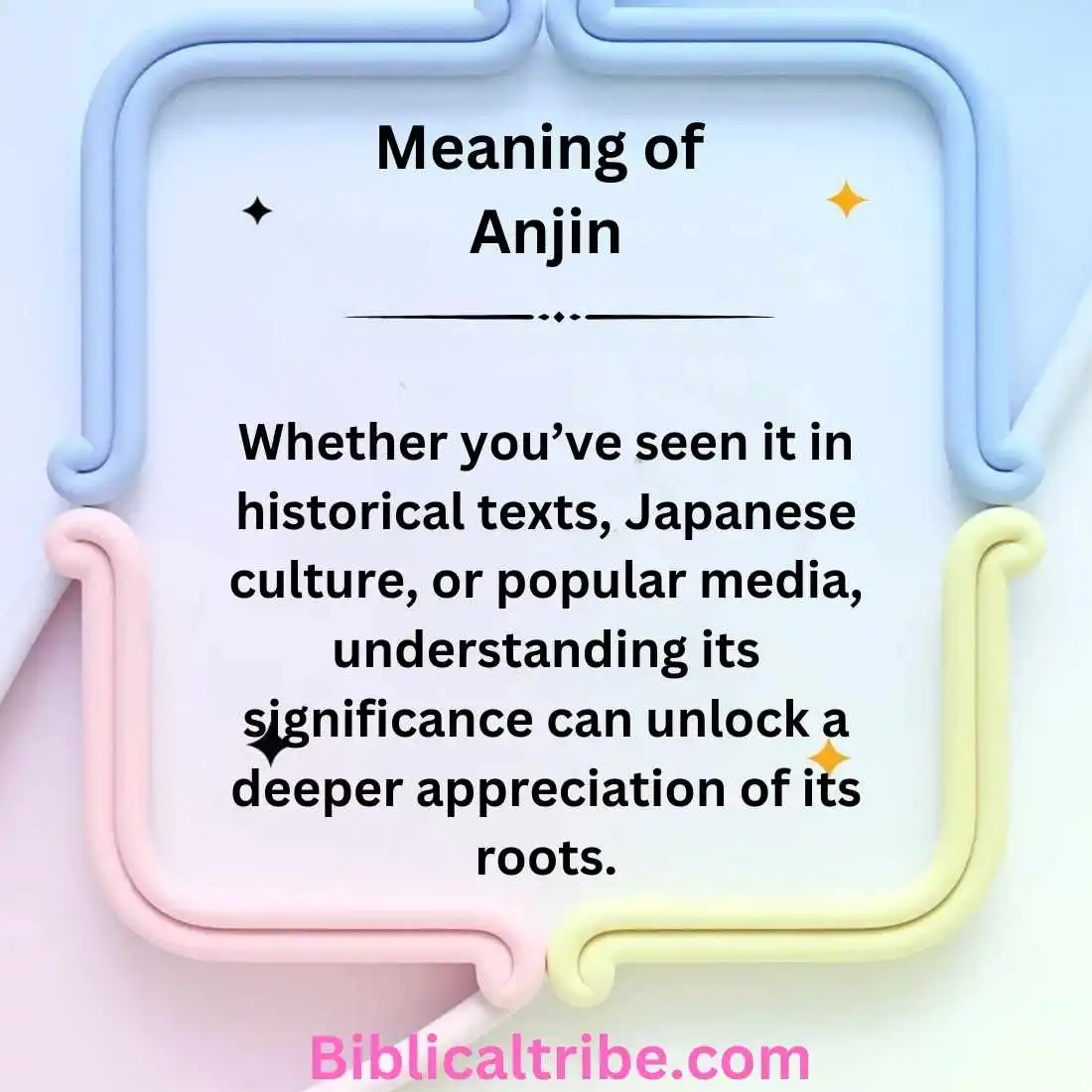Last Updated on February 2, 2025 by Ethan Richards
Have you ever come across the word “Anjin” and wondered what it truly means? 🤔 Whether you’ve seen it in historical texts, Japanese culture, or popular media, understanding its significance can unlock a deeper appreciation of its roots.
In this article, we’ll explore the true meaning of “Anjin”, its origins, and why it holds historical and cultural importance.
From its role in Japanese history to its broader interpretations, you’ll gain a clear and insightful perspective on this intriguing word.
So, why does “Anjin” matter? Let’s dive in and uncover its rich story together! 🚀
What is “Anjin”?
The term “Anjin” can take on different meanings depending on the context. In Japanese, it is often used to refer to a pilot or navigator—a person who leads or guides others through a journey, especially in maritime contexts.
But beyond this literal definition, “Anjin” holds much deeper cultural, historical, and symbolic value.
In its most common usage, Anjin refers to someone who is trusted, capable, and reliable—a leader, in many ways.
Historically, it became famously associated with the English navigator William Adams, who became known as “Anjin-san” (the “man of the pilot” or simply “the pilot”) in Japan.
Anjin in Historical Context
The history of “Anjin” is intertwined with some key moments, especially in Japan’s Edo period. The most famous story involves William Adams, an Englishman who arrived in Japan in 1600.
Adams was shipwrecked on the Japanese coast and quickly gained the trust of the shogun Tokugawa Ieyasu.
Adams’ expertise in navigation and shipbuilding was highly valued, and he was given the title “Anjin”—signifying his new role as a trusted advisor to the shogunate.
His contributions to Japan’s naval technologies and strategic importance cannot be understated.
The term “Anjin” in this context symbolized not just a navigator, but someone who bridged cultures, representing the exchange of ideas and knowledge between East and West.
Cultural Significance of Anjin
The role of “Anjin” extends beyond just maritime exploration. In Japanese culture, the title carries deep associations with honor and trust.
To be called “Anjin” was not only a mark of competence but a profound sign of respect from the people or the ruling elite.
The Samurai Connection
In the context of samurai culture, “Anjin” takes on an additional layer of meaning. The samurai were not only warriors but also acted as navigators and strategists.
The word “Anjin” in this sense reflects someone who has the wisdom to lead and the discipline to serve.
The samurai were often seen as the elite navigators of their time, whether on the battlefield or in political strategy, making “Anjin” a fitting title.
This is why William Adams, though a foreigner, was seen as a trusted “samurai” by the Japanese, particularly due to his strategic input and leadership. He was even granted a samurai title and land.
Anjin in Literature and Popular Culture
In literature, “Anjin” has also left its mark. One of the most well-known depictions of this word comes from the novel “Shogun” by James Clavell.
The book, set in the early 1600s, tells the story of William Adams’ time in Japan. Adams is portrayed as the central character who earns the title of Anjin-san, symbolizing his trusted position in Japanese society.
This portrayal of Adams and his association with “Anjin” helped cement the term’s significance in global popular culture.
It remains a powerful reminder of the complex interactions between Japan and the Western world during the early modern period.
The Shogun novel was adapted into a miniseries, further solidifying the connection between “Anjin” and its cultural significance.
The way “Anjin” is used in this context is not just as a title, but as a symbol of cross-cultural collaboration and understanding.
The Anjin Connection in the Samurai Culture
The word “Anjin” holds a particularly significant place in samurai culture, not just because of its connection to William Adams but also because of the broader philosophical implications.
In feudal Japan, samurai were more than just warriors—they were considered guardians of culture and strategic minds who helped shape the political landscape.
Anjin, in this light, embodies the idea of leadership and guidance, qualities essential to the samurai code of Bushido.
The word suggests that to be an Anjin is to guide with wisdom, whether navigating a ship or leading a country. It reflects the samurai’s role as not just warriors, but as guides of people and culture.
Modern Usage and Adaptations of “Anjin”
Over time, the meaning and usage of “Anjin” have evolved. While the term originally referred to a specific role in navigation or military leadership, it has now been adopted in various modern contexts.
In contemporary Japan, “Anjin” is not commonly used in everyday language, but it has found its place in names, titles, and businesses.
Some modern references use “Anjin” as a symbolic reminder of its historical roots, linking the past to the present. In international business, the term is sometimes adopted by companies looking to symbolize reliable leadership or strategic thinking.
In popular media, “Anjin” continues to be used symbolically. The term still evokes the qualities of leadership, trustworthiness, and cross-cultural understanding, making it a powerful metaphor in storytelling and branding.
The Linguistic Meaning of “Anjin”
Breaking down the linguistic roots of “Anjin” gives us deeper insight into its meaning. In kanji, the characters used for “Anjin” are 安 (an) and 寝 (jin). The first character, 安, means “peace” or “safe,” while the second character, 寝, translates to “sleep” or “rest.” Together, they form a word that evokes a sense of security, peace, and stability—a leader who guides others safely.
This combination of characters also ties back to the idea of guiding or navigating—leading others to safety, whether on a literal journey across the seas or through more abstract challenges.
Key Figures Associated with “Anjin”
While William Adams is by far the most famous figure associated with the term “Anjin,” there are others whose names and stories are connected to the word.
William Adams (“Anjin-san”)
William Adams, an English navigator, was shipwrecked on the shores of Japan in 1600. He eventually became the trusted advisor of Tokugawa Ieyasu, the shogun of Japan, and earned the title “Anjin-san.”
As a foreign advisor to the Tokugawa Shogunate, Adams played a crucial role in shaping Japan’s naval strategies and establishing its relationship with Western countries.
Adams’ historical significance is profound. Not only did he help modernize Japan’s shipbuilding techniques, but he also acted as an intermediary between the Japanese and Western cultures.
The Impact of “Anjin” Today
The figure of Anjin remains influential in Japan’s historical narrative and continues to serve as a symbol of international cooperation and mutual respect.
William Adams’ legacy lives on in the way that Japan engaged with the West during its Edo period and beyond.
“Anjin” in the Context of International Relations
“Anjin” represents a bridge between Japan and the West. Through Adams’ role in Japan, the term symbolizes the exchange of ideas and technologies between the East and West during a pivotal moment in history.
Adams’ success in Japan is a testament to the role cross-cultural understanding played in shaping the world we live in today.
As a foreigner who navigated not only the seas but also complex cultural dynamics, Adams’ legacy proves that understanding and respect can transcend borders.
The term “Anjin” has since been adopted by various nations as a symbol of the exchange and collaboration between cultures, most notably in areas like trade, diplomacy, and technology.
Anjin as a Symbol of Honor and Trust
The role of “Anjin” also evolved into a symbol of honor and trust in modern usage. Just like the role of a navigator or leader, “Anjin” represents someone who can be trusted to steer others through challenges.
The title implies wisdom, responsibility, and the ability to carry others through uncharted waters safely.
This symbolic meaning makes “Anjin” a powerful metaphor in both business and leadership, emphasizing qualities of strategic thinking and reliability.
Conclusion
From its historical roots to its modern implications, “Anjin” carries with it a deep and rich history that spans centuries. It represents more than just a word; it’s a symbol of leadership, trust, and cultural exchange.
Whether in literature, culture, or business, “Anjin” continues to serve as a reminder of how wisdom and cooperation transcend borders.
The meaning of “Anjin” is a testament to the enduring legacy of individuals like William Adams, whose role as a navigator shaped the path of East-West relations.
Whether you are fascinated by history, culture, or the intricate ways in which language evolves, the word “Anjin” holds an enduring significance that’s worth exploring.

Justin Taylor is a gifted storyteller and dream analyst who brings a fresh perspective to biblical dream interpretations. His engaging narratives and intuitive insights captivate readers, guiding them through the intricate tapestry of their subconscious mind.










